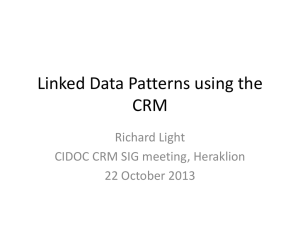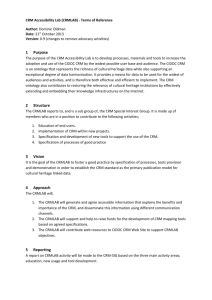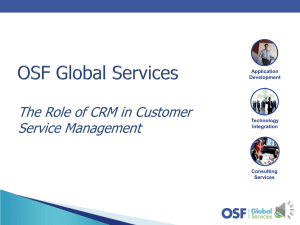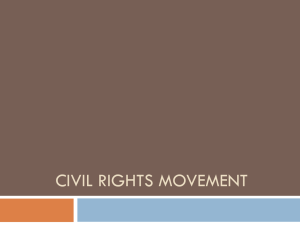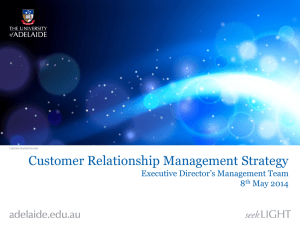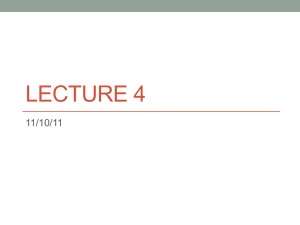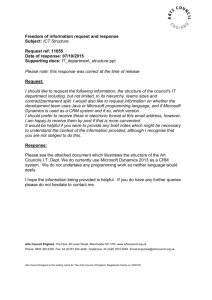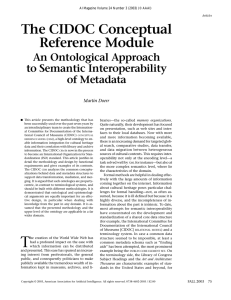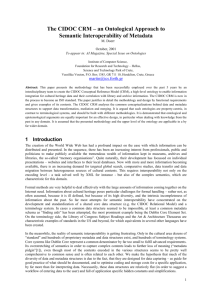Report from 7th Meeting of the CIDOC CRM SIG and Meeting of the
advertisement
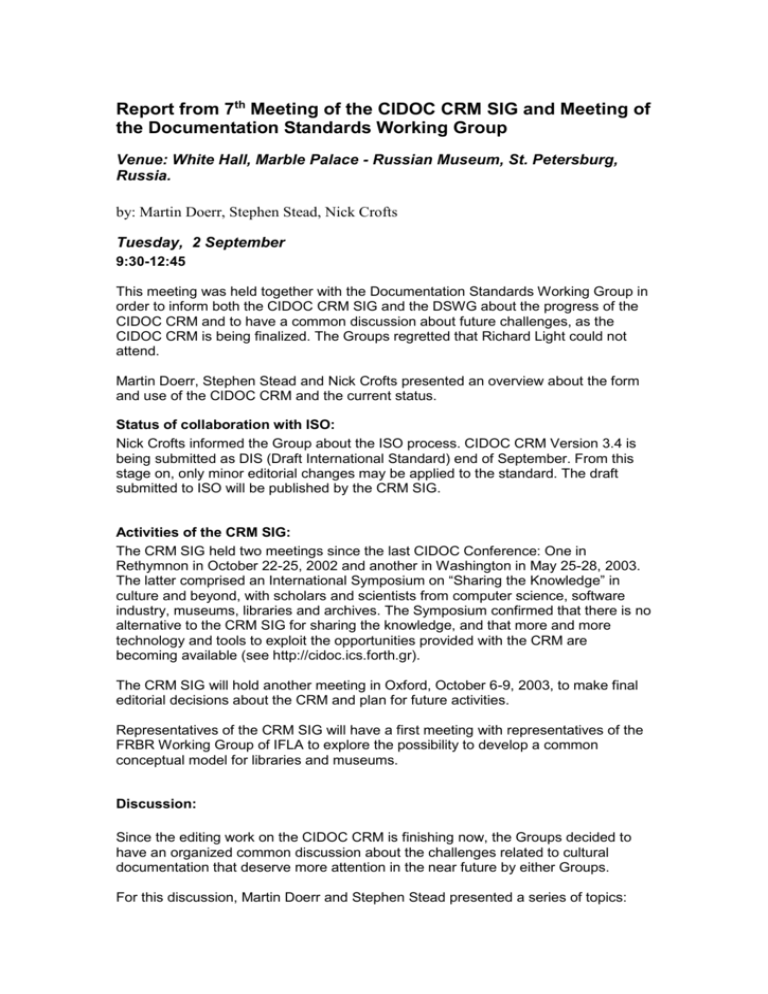
Report from 7th Meeting of the CIDOC CRM SIG and Meeting of the Documentation Standards Working Group Venue: White Hall, Marble Palace - Russian Museum, St. Petersburg, Russia. by: Martin Doerr, Stephen Stead, Nick Crofts Tuesday, 2 September 9:30-12:45 This meeting was held together with the Documentation Standards Working Group in order to inform both the CIDOC CRM SIG and the DSWG about the progress of the CIDOC CRM and to have a common discussion about future challenges, as the CIDOC CRM is being finalized. The Groups regretted that Richard Light could not attend. Martin Doerr, Stephen Stead and Nick Crofts presented an overview about the form and use of the CIDOC CRM and the current status. Status of collaboration with ISO: Nick Crofts informed the Group about the ISO process. CIDOC CRM Version 3.4 is being submitted as DIS (Draft International Standard) end of September. From this stage on, only minor editorial changes may be applied to the standard. The draft submitted to ISO will be published by the CRM SIG. Activities of the CRM SIG: The CRM SIG held two meetings since the last CIDOC Conference: One in Rethymnon in October 22-25, 2002 and another in Washington in May 25-28, 2003. The latter comprised an International Symposium on “Sharing the Knowledge” in culture and beyond, with scholars and scientists from computer science, software industry, museums, libraries and archives. The Symposium confirmed that there is no alternative to the CRM SIG for sharing the knowledge, and that more and more technology and tools to exploit the opportunities provided with the CRM are becoming available (see http://cidoc.ics.forth.gr). The CRM SIG will hold another meeting in Oxford, October 6-9, 2003, to make final editorial decisions about the CRM and plan for future activities. Representatives of the CRM SIG will have a first meeting with representatives of the FRBR Working Group of IFLA to explore the possibility to develop a common conceptual model for libraries and museums. Discussion: Since the editing work on the CIDOC CRM is finishing now, the Groups decided to have an organized common discussion about the challenges related to cultural documentation that deserve more attention in the near future by either Groups. For this discussion, Martin Doerr and Stephen Stead presented a series of topics: 1. CRM-related Topics: CRM Dissemination and Implementation Support: Organization of targeted training and presentations about the CIDOC CRM and its utility. Organization of collaborations and discussion for a for the best practice of implementing effective CRM-compatible systems. Mapping methodology and technology: Collaborations on the methodology to “map” schemata of existing information systems to the CIDOC CRM in order to (1) create automatic transformation algorithms from a given information system into a CRM-compatible form for information sharing and exchange, or (2) to verify the compatibility of an existing system or one under development with the CRM, or (3) to create query mediators that transform queries in terms of the CRM into equivalent queries that can be processed by different local information systems. Creation of a registry for existing mappings as resource for harmonization of different interpretations and guide to good practice. 2. Other Potential Topics Digital Preservation: Digital preservation has become a major topic for computer science, digital libraries, archives and others. CIDOC was not regarded as a forum to contribute much to the technical questions involved, but rather to address questions of how museums should organize digital preservation as collaborative, interinstitutional effort, to address the question which kinds of information deserve high and highest preservation efforts and how to organize those, and other questions an interdisciplinary group as CIDOC can answer better than others for museums. Thesauri Structure: The standards defining the structure of thesauri are getting old and do not reflect any more challenges of distributed environments, global electronic communication and the progress in computer science and IT to handle large formal ontologies with rich semantic structure. Several projects and national initiatives (e.g. UK) currently revise the standards for thesaurus structures. The International NKOS Forum (NKOS stands for Networked Knowledge Organisation Systems) supports the communication and exchange of experience about these efforts. Museum documentation requires a multitude of frequently quite specialized thesauri. Being rich in all kinds of knowledge, better and richer semantics of thesaurus structures are helpful in the domain. There is no other organisation than CIDOC that could represent the museum requirements in these efforts. The proposal is to produce an “ontology” or “thesaurus” of term relationships, such as different “flavours” of BT/NT, SYN, USE, UF, ALT, and the most prominent specializations of RT (partwhole, product-process, process-producer etc.) relevant for museum semantics. Such a thesaurus would allow for effectively relating different thesaurus formats and thereby integration their information. It should be used to define new standards suitable for museums. “Scientific” Questions: A major task of museums is to serve as information centres for the interested public, scientists, scholars and teachers on all levels. Whereas the questions naive museum visitors ask have been explored in some projects (e.g. CIMI’s CHIOS project), the nature of the scientific or scholarly questions to museums is widely unknown. Experts are normally not able to recover real questions from memory. As a consequence, the support of access to information systems in the domain is either based on naive assumptions or, even worse, on the needs of the administrators of museum objects only. The CIDOC CRM provides a new chance: such questions can be analysed and formalized in terms of queries to a system using the CRM as schema. The proposal is to organize the creation of a repository of real scientific and scholarly questions as a public resource maintained by CIDOC to support research for better information systems, by collection from respective archives of various museum departments. Museum Directories/Collection Level Description: Museums maintain a good practice of creating information systems about their objects. Archives on the other hand typically describe fonds or collections as a whole, rather than the individual document. With more and more museums providing on-line information services, there is a need to characterize the subject and holdings of museums as a whole in an organized way. There is a need to develop a methodology and data format for that purpose. Reference Architecture and Workflow: Larger museums encounter a problem to access what is called in industry “enterprise knowledge”. They employ necessarily a multitude of systems, such as collection management, content management, image bases, library systems, web presentations, catalogue publishing etc. These systems cannot reasonably be merged into one monolithic, and there are frequent updates to any component. There is a need to effectively share knowledge residing in all those systems within an organisation, and then between organisations. The proposal is to collaborate with museums, projects, computer science and implementers to develop reference architectures for effective knowledge sharing, based on an analysis of the work flow of information production and information consumption, the needs to employ specialized systems and the chances to merge systems. FISH: FISH proposes to become a CIDOC Working Group or part of a CIDOC Working Group Natural History: Natural History museums are under-represented in CIDOC. The proposal is to elaborate the needs for information sharing between Natural History and other museum disciplines and to update documentation practice under that view point. After the discussion of these proposals indicative votes were taken for each proposal. The topic of Digital Preservation found such strong interest that a new group under the leadership of Regine Scheffel was founded. All CRM related topics found the strong interest of the majority. Enough supporters were found for the topics “Thesauri Structure”, “Scientific Questions” and “Museum Directories/Collection Level Description”.
